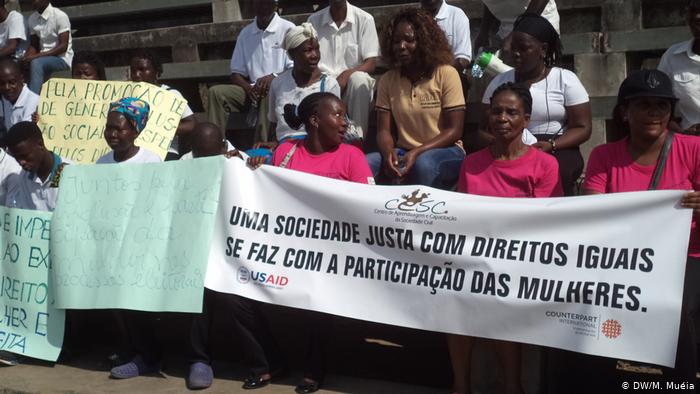Mozambique: FAMOD demands inclusion in “national dialogue”
Mozambique elections: Of 30 heads of list, only five are women

Women protest against discrimination in Mozambican politics (archive photo)
Only five of the 30 heads of list of the elections in Mozambique on 15 October are women, a low number, according to experts. What is the reason? Lack of interest or little space in a man-dominated environment?
Francisca Tomás in the province of Manica, Judite Massengele in Niassa, and Margarida Mapanzene in Gaza (Frelimo), Angela Eduardo in Cabo Delgado (Renamo) and Carla Fabião Mucavele in Gaza (MDM): these are the five women running in the provincial elections on 15 October.
A low number, especially at provincial and municipal level, according to Elisa Muianga of the Institute for Multiparty Democracy (IMD).

The number is also low compared to data from the last voter registration, which shows that 53% of the country’s electorate is made up of women. A majority which continues to be represented in national political forums mostly by men.
“Practically, we have no political party which has a woman secretary-general or a woman president. If there is one, it must be such a very small party, with little representation,” she says.
Male chauvinism and lack of unity
For Muianga, male chauvinism and lack of unity among women are factors that may explain the low participation in politics.
“Women in Mozambique are starting to get interested now, to realise that politics is their daily life and that they should be members. But they obviously face an obstacle, because men think that political space is their space. They are the ones who know about things, they dictate the rules,” she says.
Maria Inês Martins, representative of the Mozambican National Resistance Women’s League (Renamo), also believes that male chauvinism is a problem that affects all political parties.
“Mozambique is a country with male chauvinistic characteristics and this male chauvinism is the challenge we have to face for us to conquer our space. There are very good laws in favour of women, such as the African Charter, resolution 1325. Now we have to spread and apply them,” she says.
Rule review
However, some rules within political parties should be reviewed. The choice of candidates for heads of list, for example, is usually made by the leadership of the parties, which are mostly men. A problem that, according to Martins, is worsened by the lack of unity among women.
“We can say that the selection of candidates for heads of list is a democratic process only in quotation marks. The election is as follows: first the body nominates, sends it [the nominations] to the grassroots, and the base in turn elects through the conferences. Meanwhile, the names are advanced and within these names there may be men and women. In this process, we have these two fronts to face: the man himself, who often makes barriers to the woman, and the woman herself, making a barrier to the other woman,” she explains.
Judite Sitoe, leader of the Mozambican Democratic Movement (MDM) women’s league, agrees that men sometimes interfere with women’s candidacies in the struggle for power, and that women in turn do not support each other. “They show other women that this woman is not capable, but that he is capable. And women, instead of supporting each other, support the man,” she says.

Lack of initiative and unity
But MDM Secretary-General Jose Domingos Manuel believes that the problem is not the parties, nor the men, but the lack of initiative on the part of women and the lack of unity among them. “We end up with just men contesting. Few women try, and when they try, there is the problem of them not supporting each other,” he says.
Sitoe agrees that, in addition to problems such as male chauvinism, there is in fact some lack of confidence in women themselves,s and in the work of other women.
“In some cases, it is women themselves who do not trust themselves, and sometimes women do not trust each other,” she says.
As a solution to the problem of lack of trust, Sitoe is focusing on empowerment to encourage them to compete with men and to assist the work of other women. “There needs to be more empowerment of women. We need to empower more and also empower ourselves,” she concludes.












Leave a Reply
Be the First to Comment!
You must be logged in to post a comment.
You must be logged in to post a comment.